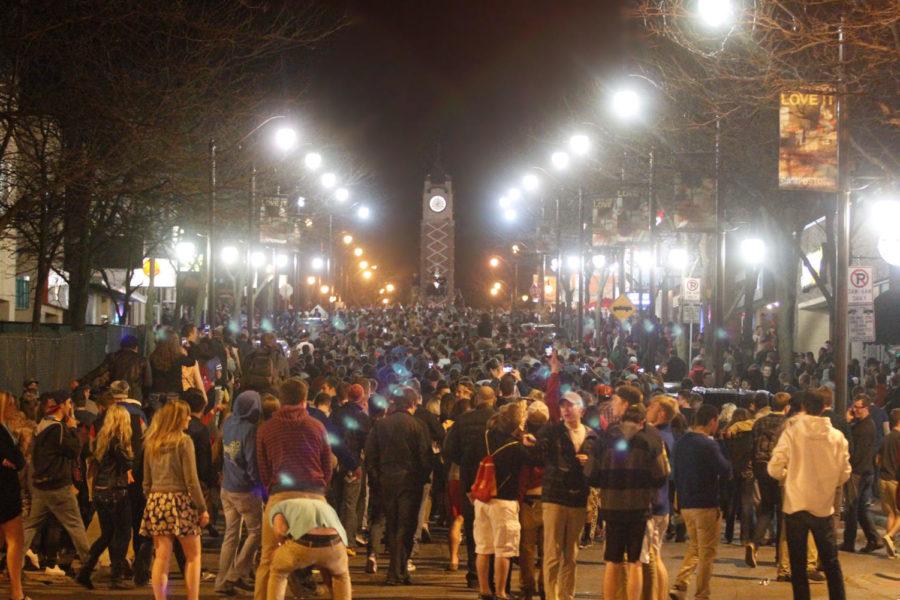A changing tradition: Ames residents feel effects of lost event, plan ‘new’ Veishea
August 25, 2014
The students who witnessed and participated in the riot during Veishea 2014 are now filling the bars and restaurants on Welch and Stanton avenues, where the riot occurred.
Many freshmen, who only read about and saw images of the destruction, are being invited to unofficial Veishea events on Facebook for the second week of April in 2015 to replace the 92-year tradition.
Students, administrators and alumni are asking what happens when the tradition dies but unofficial traditions live on.
Tom Hill, senior vice president for student affairs, headed the Veishea Task Force and found that the recommendations by both the 1992 and 2004 task forces mirrored the concerns of the 2014 task force.
“Both said if it happens again, they should discontinue,” Hill said of the 1992 report. “Well, it happened again. We didn’t discontinue it.”
The Veishea Task Force made its recommendation to discontinue the event to President Steven Leath, who announced Aug. 7 his decision to discontinue the event and retire the name.
The countless implications of canceling the event — the end of traditional activities with which thousands of alumni identified, the celebration of the university, the loss of scholarships on which some students relied and the end of hands-on professional training for students through the organization committees — are not lost on the president or the university.
The problem, Hill continued to say, was that the focus of Veishea had shifted from celebrating the university to entertaining students.
“On the one hand, you have the official Veishea, which is the activity that people love and revere. It’s all good,” Hill said. “Then you have the unofficial Veishea that does virtually everything that’s not good. You can’t separate them. That’s what those reports underscored to me.”
However, Hill said he realizes that the unofficial events centered on beer bongs, house parties and binge drinking will not fall by the wayside.
“It’s common in higher education all over the country today,” Hill said about party culture. “That leads to violence, increased incidents of sexual assault, a number of things. That’s one of the top concerns on college campuses today.”
Katie Allen, junior in mathematics, reinforced Hill’s point that the focus of Veishea had become less about the university and more about a culture of partying and entertainment.
“My parents went here and it wasn’t a big deal because they were all legal to drink. I think alcohol’s always been a factor because it’s illegal now,” Allen said. “It was almost 100 years old. What’s the problem now? My parents went here in the ’70s. It was a drinking problem then, it’s a drinking problem now.”
Following the 2004 riot, then President Gregory Geoffroy canceled the 2005 events, putting Veishea on a somewhat probationary period. In 2014, the 10-year anniversary of the 2004 riot, festivities got out of hand as early as Tuesday night without the usual out-of-town celebrators.
“I know there’s been riots before, but obviously we’re not going to be that crazy next year if it continues,” Allen said. “We made it 10 more years, and we made it 10 years without anything happening.”
Allen said instead of canceling the tradition, the university should have focused on teaching students how to recognize when a situation gets out of hand and the warning signs of a riot. Students should also realize that simply being in the crowd amplifies the situation.
Sydney Weis, freshman in animal science, said she had the opportunity to participate in Veishea activities before but had still looked forward to enjoying it as a student.
“I’m upset because it’s a school tradition and I’m never going to be able to experience it [as a student],” Weis said. “I think it kind of just got blown out of proportion. It was something I was looking forward to.”
The unofficial traditions already thrive on social media with students and companies planning activities — some centered on alcohol and parties, some traditional.
“It’s unfortunate, but you have to expect that,” Hill said. “You’ve got something that’s been eliminated that a segment of the population really enjoyed. There’s nothing at this point in time that’s been designated to replace it, so there’s that vacuum.”
“I’ll definitely participate, but I don’t think it’s going to be a problem,” Allen said of the events.
Despite Allen’s prediction, Hill said the collaboration between administrators and Ames city officials will still be strong throughout the year.
“Something’s going to happen, either planned or unplanned … or both,” Hill said. “I’d like to think we will get involved in having something that will be planned and sanctioned by the university during that time.”
After his Aug. 7 decision, President Leath said any events planned by the university will have a clear focus, not a weeklong celebration that leads to a lot of hype.
“I think our major focus would be on students and activities that they can engage in without having that risky behavior associated with it,” Hill said. “Whether or not we do something that would try to appeal to alumni and others at the same time is yet to be determined. When you start trying to pull all those big entities together, that’s when you lose focus and get these big events. That draws the folks you want to draw and the folks you don’t want to draw.”
The important thing, Hill said, is to not rush planning of events for this year. Any event planned may lose focus and create an opportunity for other risky behaviors.
As for students planning to put on events like the Veishea parade again this spring, Hill said plan away, as long as it does not focus on risky behaviors.

















